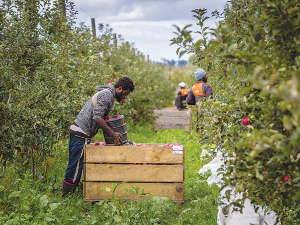Village to Village: Loans and learning for RSE workers
A new social enterprise to repay the sacrifice of seasonal workers represents chicken feed for Allain Liu-Vitivae - in all the right ways.
 In August, the Minister for Immigration confirmed a review of the RSE scheme would take place early next year.
In August, the Minister for Immigration confirmed a review of the RSE scheme would take place early next year.
The New Zealand Council of Trade Unions (NZCTU) recently met with Minister for Immigration and Minister for Workplace Relations Michael Wood to convey its concerns regarding the Recognised Seasonal Employer (RSE) scheme.
The RSE scheme allows the horticulture and viticulture industries to recruit workers from the Pacific Islands for seasonal work.
NZCTU president Richard Wagstaff says migrant wellbeing needs to be at the centre of all discussions on the issue.
“As unions we cannot stand by while there are reports of RSE workers in NZ facing exploitation and unacceptable working and living conditions,” says Wagstaff.
“These workers are vulnerable and need stronger protection and advocacy so they don’t become victim of rip-off employers.”
In August, Minister Wood confirmed the Government would start a review of the scheme early next year, a move the NZCTU supports.
“We expect that process to result in better outcomes for RSE workers. This review needs to result in changes that will bring us all confidence that RSE workers have clear and unambiguous rights to decent work and decent living conditions in NZ,” says Wagstaff.
He says the review also needed to clarify how those rights will be monitored and enforced.
Wagstaff says, in light of reports of mistreatment of RSE workers, the NZCTU and its affiliates do not support the increase to the number of RSE workers allowed into New Zealand announced late last month.
“However, we are pleased to see the Minister issue an immediate improvement to sick leave entitlement, and the NZCTU and unions will be actively participating with industry to make some immediate improvements and progress on a range of issues.”
Those issues include improving accommodation, providing independent support and benefits, and better managing poor employers.
An independent report, prepared for Alliance farmer shareholders is backing the proposed $250 million joint venture investment by Irish company Dawn Meats Group.
Whangarei field service technician, Bryce Dickson has cemented his place in John Deere’s history, becoming the first ever person to win an award for the third time at the annual Australian and New Zealand Technician of the Year Awards, announced at a gala dinner in Brisbane last night.
NZPork has appointed Auckland-based Paul Bucknell as its new chair.
The Government claims to have delivered on its election promise to protect productive farmland from emissions trading scheme (ETS) but red meat farmers aren’t happy.
Foot and Mouth Disease outbreaks could have a detrimental impact on any country's rural sector, as seen in the United Kingdom's 2000 outbreak that saw the compulsory slaughter of over six million animals.
The Ministry for the Environment is joining as a national award sponsor in the Ballance Farm Environment Awards (BFEA from next year).